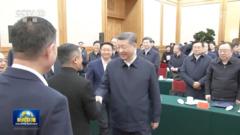Jack Ma’s attendance at a recent economic symposium has generated a mix of optimism and speculation about the future of China’s technology sector and economic policies, especially after his years of absence from the public eye. Following his criticism of the financial sector in 2020, the charismatic founder of Alibaba seemingly faced the wrath of the Chinese government, prompting questions about his rehabilitation. His return is seen as a signal that Beijing may be softening its stance toward the tech industry, just as the sector appears ready for a rebound amidst global shifts and local market adjustments.
Jack Ma's Return: A Harbinger for China's Economic Shift?

Jack Ma's Return: A Harbinger for China's Economic Shift?
The unexpected re-emergence of Alibaba's founder Jack Ma at a key meeting with President Xi Jinping sets the stage for a potential turnaround in China's tech landscape.
Recent reports indicated significant positive responses following Ma's public appearance, with Alibaba’s shares soaring over 8% after they announced results that exceeded expectations. Market analysts widely interpret Ma’s presence at the event, alongside prominent business leaders and Xi Jinping, as an indication of greater acceptance and possibly a shift in policy regarding the private sector, especially concerning the tightening grip of government regulations on tech companies.
The recent partnership between private firms and government sentiment has proven advantageous, as the Chinese leadership emphasized the need for innovation and growth despite existing economic challenges. Commentators believe that Ma’s return could signal an end to the stringent crackdown experienced by tech firms, aimed at promoting “common prosperity” after extensive market regulations and reduced valuations crippled many companies.
Moreover, with key innovations like DeepSeek's AI chatbot sparking national pride, investors are once again looking favorably upon Chinese tech stocks. Jack Ma's reemergence may reflect a critical pivot in Beijing from restraint to a more collaborative approach with private enterprises, emphasizing the need for a blend of economic ambition and adherence to state priorities.
While concerns linger about how far Ma’s return signifies a complete restoration to his former status, there’s hope this might usher in an era of growth for China's tech scene. As policymakers lean toward fostering high-quality development and advanced manufacturing, private sector collaboration will be crucial in achieving ambitious economic goals by 2035.
Investors and tech leaders alike sense a shift, suggesting that the uncertainties surrounding China's regulatory environment may soon evolve into a more stable partnership, where contributions from private companies can fuel innovation and economic resilience.
The recent partnership between private firms and government sentiment has proven advantageous, as the Chinese leadership emphasized the need for innovation and growth despite existing economic challenges. Commentators believe that Ma’s return could signal an end to the stringent crackdown experienced by tech firms, aimed at promoting “common prosperity” after extensive market regulations and reduced valuations crippled many companies.
Moreover, with key innovations like DeepSeek's AI chatbot sparking national pride, investors are once again looking favorably upon Chinese tech stocks. Jack Ma's reemergence may reflect a critical pivot in Beijing from restraint to a more collaborative approach with private enterprises, emphasizing the need for a blend of economic ambition and adherence to state priorities.
While concerns linger about how far Ma’s return signifies a complete restoration to his former status, there’s hope this might usher in an era of growth for China's tech scene. As policymakers lean toward fostering high-quality development and advanced manufacturing, private sector collaboration will be crucial in achieving ambitious economic goals by 2035.
Investors and tech leaders alike sense a shift, suggesting that the uncertainties surrounding China's regulatory environment may soon evolve into a more stable partnership, where contributions from private companies can fuel innovation and economic resilience.
















